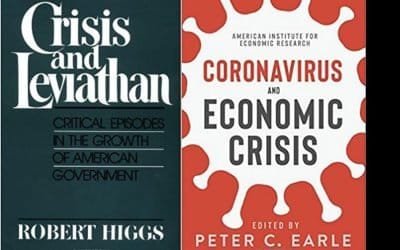To the extent capitalism fosters the creation of wealth – a truth denied today only by the hopelessly biased – it also fosters the creation of health.
Richard M Salsman
Crisis, Leviathan, and the Odd Libertarian Sanction
Libertarians are right that the size, scope and power of government expand amid crises, but there’s no necessity to this, as they assume, and they have no remedy – even during crises – because they hate the state more than statism; but a new book takes a better approach.
President Trump’s Wuhan Virus War: Protectionism Magnified
The false principle that fueled Trump’s trade war relates closely to his authoritarian response to the Wuhan (Covid-19) virus.
Incarceration, Monetization, and Nationalization Can’t Preserve Our Health or Wealth
Evidence is mounting that the Wuhan China virus (“COVID-19”) won’t prove as deadly as first projected; yet there’s still a high level of hysteria and an ominous spread of deleterious economic and public health policies, amounting to incarceration (indiscriminate quarantines), monetization (redistribution of wealth), and nationalization (socialism/fascism). What’s needed instead – if health and wealth are desired – is deregulation, tax relief, and capitalism.
Judy Shelton: Golden Nominee for a Tarnished Fed
Judy Shelton is a high-class, high-quality economist, who should join the Fed not so much to burnish its image but to keep it at least a little bit honest and real. The Fed today doesn’t really deserve Shelton, but Shelton deserves a top place at the Fed.
Say’s Law versus Keynesian Economics
Say’s Law and Saysian economics go hand in hand with a political-economic-philosophical appreciation for capitalism – for rationality, the pursuit of self-interest, entrepreneurialism, profit-making, private property rights, the rule of law, and constitutionalism.
Video: Money, Banking & Public Finance
An introduction to political economy focusing on money, banking and funding of government.
Paul Volcker’s Anti-Capitalist Legacy Against Free-Market Banking
By helping to cut the dollar’s tether to gold, Volcker helped Washington’s politicians engage in perpetual fiscal profligacy.
Why the U.S. Yield Curve Reliably Predicts U.S. Recessions
Economists, investors, and policy makers would do well to take seriously the predictive power of the yield curve, to study and comprehend not only its empirical but also its causal features.
Congress Seeks To Boost Teen Joblessness By Increasing The Minimum Wage
A mandatory minimum wage rate, to the extent it’s set above the market-clearing wage rate, causes unemployment.
Free Things and Unfree People
The freebies approach to political campaigning and policymaking brazenly panders to mooching and, by expanding the size, scope, and power of government, also institutionalizes looting. As politicians today assert, so loudly and sanctimoniously, that things like food,...
The Financial Crisis: Lessons Not Learned
The financial crisis of 2008-9 — accompanied by the Great Recession was caused by government intervention, mainly in mortgage finance and the housing sector.
“Sanctified Capitalism”: Radio Icon Dave Ramsey Butchers Capitalism
Another sad case of a conservative unable to defend capitalism, because they are unable to understand reason and thus the virtue (and practicality) of rational self-interest
As the U.S. Government Grows, American Prosperity Slows
Economic growth has been faster when the federal government has been smaller (relative to GDP) – and vice versa.
Why Conservatives Won’t Defend Capitalism
Conservatives won’t defend capitalism because they won’t defend its morality, rational egoism, and won’t defend that morality because they’re wedded to religion and its ethic of altruism.
Punitive Taxation of America’s Richest
There’s nothing moral, “fair” or “progressive” about a graduated (communist) tax schedule.
The Production of Money Isn’t (Necessarily) the Production of Wealth
The creation of money doesn’t create wealth, unless money itself is wealth — as it was when it was gold and silver.
Spring Break in Caracas
Although it may be difficult today for American socialist students to study abroad in places like Cuba or North Korea, they could lobby U.S. officials to facilitate it.
The Myth of “Imperfect” Capitalism
Capitalism is perfect precisely to the extent it’s the only social system consonant with human nature.
Capitalists: The Most Valuable Yet Endangered Species
Far more important than a debate about the relative practicality, efficiency, or productiveness of capitalism and socialism is a debate about their relative moral merits.
Anti-Socialism Isn’t (Necessarily) Pro-Capitalism
The best defense is a good offense; yet many people today still resist capitalism as morally offensive.
Subscribe for free.
Latest pro-Capitalism goodness sent weekly to your email box.
No spam. Unsubscribe anytime.



















